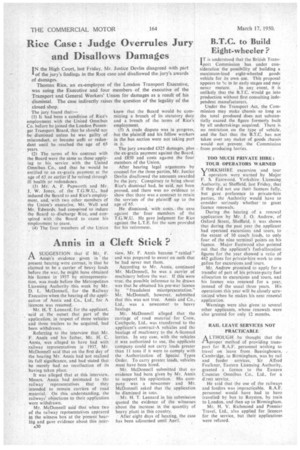B.T.C. to Build Eight-wheeler ?
Page 32

If you've noticed an error in this article please click here to report it so we can fix it.
I T is understood that the British Transport Commission has under consideration the possibility of building a maximum-load eight-wheeled goods vehicle for its own use. This proposal appears to Se in its early stages and may never mature. In any event, it is unlikely that the B.T.C. would go into production without first consulting independent manufacturers.
Under the Transport Act, the Commission may make chassis so long as the total produced does not substantially exceed the figure formerly built by all undertakings acquired. There is no restriction. on the type of vehicle, and the fact that the B.T.C. has not taken over an!, maker of goods chassis would not, prevent the Commission from producing lorries.
TOO MUCH PRIVATE HIRE: TOUR OPERATORS WARNED
VORKSHIRE excursion and tour I operators were warned by Major F. S. Eastwood, Yorkshire Licensing, Authority, at Sheffield, last Friday, that if they did not use their licences fully, but gave preference to private-hire parties, the Authority would have to consider seriously whether to grant licence renewals.
During the hearing of a renewal application by Mr. J. 0. Andrew, of Oxford Street, Sheffield. it was shown that during the past year the applicant had operated excursions and tours, to the extent of 10 coach loads, to only four of the nine terminal points on his licence. Major Eastwood also pointed out that the applicant's fuel-allocation figures for the year showed a ratio of 442 gallons for private-hire work to one gallon for excursions and tours.
Mr. Andrew promised to apply for a transfer of part of his private-party fuel allocation to excursions and tours, and his licence was renewed for a year, instead of the usual three years. His operations this year will be closely scrutinized when he makes his next renewal application.
Warnings were also given to several other applicants, whose renewals were also granted for only 12 months.
RAIL LEAVE SERVICES NOT PRACTICABLE
A LTHOUGH he thought that the i—Iproper method of providing transport for R.A.F. personnel wishing to travel on leave from Basstingbourn, Cambridge, to Birmingham. was by rail and feeder services, Sir Alfred Faulkner, Eastern Licensing Authority, granted a licence to the Eastern Counties Omnibus Co.. Ltd., for a direct service.
He said that the use of the railways and feeders was impracticable. R.A.F. personnel would have had to have travelled by bus to Royston, by train to London. and then up to Birmingham.
Mr. H. V. Richmond and Premier Travel, Ltd., also applied for licences for the service, but their applications were refused.




























































































